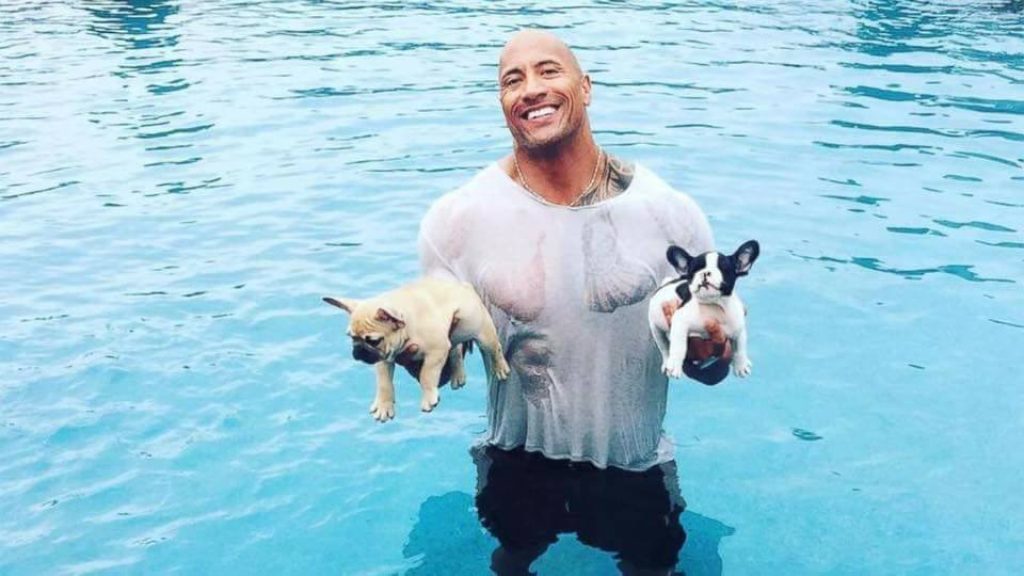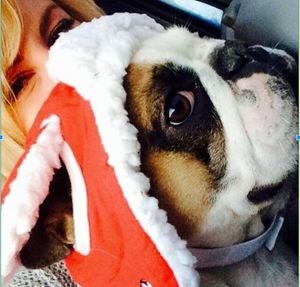
In just four years the French Bulldog has risen the ranks from Australia’s 11th most popular breed in 2013 to their fourth most popular breed in 2017.
Their popularity isn’t limited to the southern hemisphere either, with the Frenchie reigning supreme as the most popular small breed in the US last year.
Here’s one of the reasons why:

French Bulldog-inspired designs are even cropping up in prominent apparel and home decor lines. You see Bulldog paraphernalia everywhere, right?
That makes the Frenchie “King of the Merch!”

The popularity of the French Bulldog is not a new fad. In fact, they’ve been prized companions for much longer than you might think!
In this guide to the French Bulldog we’ll take a good look at their behaviour and mannerisms, and most importantly whether they’re suitable for you and what you should feed them!
French Bull Dog History
The mid-19th century saw a rise in the popularity of smaller Bulldogs, particularly in Nottingham, England, where they were the favourite companion of lace makers since they kept down rats.
Over time the demand for handmade lace lessened due to the rise of the Industrial Revolution. Lacemakers in fear of being replaced by machines, relocated to Northern France where the craft was still in full swing, taking their beloved pets along for the move.
These toy bulldogs became a favourite pet of French prostitutes who nicknamed them “Bouledogues Francais” which translates to “French Bulldog”, needless to say, the moniker stuck, spreading with them on their journey across the ocean to America in the early 1900s where they were readily accepted.
The “rose-ear” feature that was preferred by the French was deemed unacceptable by Americans and were further bred down with pugs and other terriers to achieve the upright “bat ear” appearance of modern-day Frenchies.
Who are French Bulldogs Best for?
French Bulldogs (or Frenchies) make wonderful pets for most people, no matter our lifestyle, but are ideally suited to the following:
- People who live in apartments or units
- Elderly people
- Couples
- Single people
- Less-active owners
- Families with older children
What to feed a French Bulldog?
For French Bulldogs (and Bulldogs in general) I’ll cover what to feed them before I cover the health conditions which affect the breed. The reason for this is diet plays a significant part in the health of Bulldogs, and a good diet should prevent many of the health conditions they can suffer from.
So, in short, if you’re going to buy a Bulldog puppy, make sure you can afford a diet which will keep them healthy.
French Bulldogs sometimes have problems absorbing nutrients from food, which can lead to a special (sometimes costly) diet or supplements. In fact, while writing this guide I’ve just replied to a Aussie Bulldog owner who’s had to switch to a vegan diet due to the disrupted microbiome problems of her dog.
Firstly, I highly recommend avoiding any dry dog food containing wheat or cereals (especially those with by-products of those grains). The symptoms which can occur are skin rashes, itchy paws, itchy/yeasty ears, flatulence, and over time weight gain and all manner of health issues.
All Bulldogs tend to be affected more by bad diet, medications, and antibiotics than other breeds. Sometimes this can disrupt the microbiome leading to a gut which simply won’t digest many foods effectively.
Related: Recommended dog foods.
This gets me to my next point.
Supplements are well worth considering for this breed, especially when your budget prevents you buying an expensive premium dog food.
Probiotics are a great idea as these will help your Bulldog digest their food far more effectively. Read the full guide on probiotics which will fill you in completely and give you recommendations.
Adding variety to your Bulldog’s diet should be a good thing, unless they struggle with food intolerances. If a dry food forms most of their diet, maybe add some BARF patties (frozen patties you find in the freezers of most pet stores), or some fresh meats/organs/meaty bones/other fresh foods.
When feeding a Bulldog raw meaty bones just make sure you feed them a bone appropriate to their size and eating habits – you don’t want your dog swallowing a knuckle bone for example. Always take care if your dog is a “gulper”, and watch them while they chew on a bone if you’re in any doubt.
Also be wary of cheap treats (most contain wheat/cereals), and invest in quality toys (such as Kong) – cheap toys will be destroyed quickly and pose a choking hazard.
Health Concerns
French Bulldogs are prone to a number of health conditions. The last thing I want to do is scare you off from owning such a wonderful breed, so it’s worth saying there are some great ways to prevent these conditions occurring.
Diet is one, which I’ve covered above, as it has to be said I’ve found Bulldogs to be very prone to issues from a poor diet (itchy skin, rashes, yeasty ears, gas, and worse).
If you’re looking at buying a French Bulldog puppy then just be aware of these potential health conditions, as that’s the best way of preventing them:
Facial Structure
Due to their facial structure, French Bulldogs are very susceptible to Brachiocephalic Airway Syndrome (also known as Congenital Obstructive Upper Airway Disease).
This disorder is caused by one or more anatomical misformations including small nostrils, narrow trachea, everted laryngeal saccules (air sacs), and an elongated soft palate that partially obstructs the airway.
These abnormalities can cause a number of issues that range in severity including noisy breathing, fatigue, gagging/vomiting, fainting, and heart problems.
This disorder often gets worse during hot weather and makes Frenchies much more susceptible to heat stroke.
Reproductive Problems
Reproductive problems are more common than not in this breed. Breeding after five years of age is severely discouraged.
Genetic Spinal Deformities
Frenchies are prone to genetic spinal deformities such as hemivertebrae, a painful condition where the spinal cord is constricted by misformed vertebrae. Surgery to correct these deformities is expensive, forcing some owners to euthanise. Untreated hemivertebrae can result in paralysis, incontinence, and excruciating pain for the canine.
Inter-vertebral Disc Disease
Inter-vertebral Disc Disease (IDD) is another common skeletal problem with this breed and is characterised by slipped spinal discs that can constrict the spinal cord causing paralysis and even death.
Pulmonic Stenosis
Pulmonic Stenosis or narrowing of the pulmonary artery is somewhat common with this breed and can lead to fatigue or collapse during vigorous exercise or in severe cases Congestive Heart Failure.
Hip Dysplasia
Hip Dysplasia is common in active Frenchies and can cause limping, pain, and immobility of the back legs. This disorder can be corrected with periacetabular osteotomy surgery or made more manageable with medication
Retinal Dysplasia
Retinal Dysplasia is a hereditary condition characterised by the malformation of the retina. This disorder causes vision impairment, though it is not progressive or life-threatening.
Hypothyroidism
Hypothyroidism (also known as under-active thyroid) usually presents itself in affected dogs around four years of age. This is usually not life-threatening but it can cause hair loss, weight gain, dull coats, and may require medication.
Atopic Dermatitis
Atopic Dermatitis (also known as eczema) is prevalent in this breed. Using hypoallergenic shampoos and bathing less frequently can help control the symptoms.
Heat Stroke
Heat stroke is extremely common with this breed, because of this French Bulldogs should never be left outside for extended periods during hot or humid weather.
Life Span
9-11 years
French Bulldog Price Range
The average cost for a French Bulldog in Australia ranges from $3,500 to $4,000 but can be more (or less) depending on colour, lineage, paperwork, and breeder preference.
Male pups (not spaded) from show dog parents go for around $6,000-$7,000.
The steep prices are due to reproductive difficulties in the breed, causing most breeders to resort to artificial insemination.
Natural birth is extremely dangerous for Frenchies, so C-sections are required, which makes breeding quite costly.
Furthermore, there is a very small window of opportunity for the females, since it is unsafe for them to give birth after five years of age.
Tips from French Bulldog Show Breeders
- French Bulldogs sometimes develop dry, cracked skin on their noses, a soothing balm like Natural Dog Company’s award-winning Snout Soother. This balm uses natural botanicals including organic grapeseed oil, hemp-seed oil, jojoba oil, and Vitamin E to ease the pain and moisturise affected areas.
- Often French Bulldogs will develop tear stains; a gentle sodium hydroxide-based stain remover product will work to diminish discoloration, while not agitating the skin. We like the Petpost Tear-Stain Remover products, just make sure you rinse any remaining product with water after cleansing.
- Breeders of brachiocephalic breeds swear Natural Dog Company’s “Organic Wrinkle Balm” which helps to eliminate odour and prevent skin infections and chafing caused by moisture trapped in the facial wrinkles.
- Frenchies require shampoos with a super-gentle formula to so as to not trigger skin issues, Earthbath Ultra Mild Puppy Shampoo is a top pick for breeders (plus it smells like cherries)!
- Vets and breeders alike recommend adding omega-3 fatty acids and vitamin E supplements to keep French Bulldog’s skin moisturised and itch-free.
What do owners have to say about their Frenchie?
Below I’ve included some feedback from French Bulldog owners. If you’re looking at buying a French Bulldog puppy make sure you check out social media community groups and get a real feel for the breed. These groups are also great for finding a reputable breeder (highly recommended).
If you have a Frenchie yourself, please tell us all about him in the comments section below!

“Advice I would give is don’t take the cheap way out. This breed can be pricey.
Do not look for the cheapest Frenchie to buy. It will more than likely be poorly bred with the many issues listed above.
Also, you cannot go cheap on their dog food.”
Lisa Eger owner of Darla

“Tegan is everyone’s best friend, and she has so much heart to go around for all, but she is not one for camping, hiking or even walking an art festival. She grows tired super quick when out and about, sadly.
Tegan loves coming across other dogs, but other dogs look at her sideways since she makes some weird dog noises.
We have a tortoise, Goldie, that she likes to follow and protect (too closely) with her giant paws”
Roxie Covell owner of Teagan
The Frenchie Wrap Up
Although they are quite expensive in comparison to other popular purebreds, French Bulldogs make extraordinary companions with a fun personality and cheerful disposition.
Those thinking of buying or adopting a Frenchie should make sure they can accommodate their physical limitations and are prepared to deal with the health risks associated with this breed. Be prepared to feed a good diet which is meat-based and avoid cheap grain-based kibbles.
You won’t find a high-impact adventurer in this breed, but you will find a loyal companion who will love you until the end.
If you do take home a Frenchie, then make sure you stock up on designer mugs, sweaters, and everything you can think of with a Bulldog on it! I’ll make a guess and say Etsy is probably 50% French Bulldogs!





